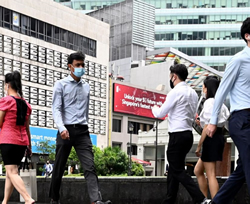 Singapore’s Public Service Division (PSD) is to adjust the salaries of Administrative Service officers as well as judicial and selected statutory appointment-holders by between five and 12 per cent from October.
Singapore’s Public Service Division (PSD) is to adjust the salaries of Administrative Service officers as well as judicial and selected statutory appointment-holders by between five and 12 per cent from October.
In a statement, the PSD said these salaries were last adjusted almost 15 years ago.
“Since then, gaps with market benchmarks have increased significantly,” the PSD said.
“These adjustments will enable the Public Service to continue to attract and retain its fair share of talent for key leadership roles.”
It said the salary adjustment would affect about 300 Administrative Service officers as well as 30 judicial and statutory appointment-holders.
This includes the Chief Justice, Judges of the Court of Appeal, Appellate Division and the High Court, as well as Judicial Commissioners.
Aside from those, the Attorney-General, Deputy Attorneys-General, the Chair of the Public Service Commission and the Auditor-General are also set to benefit from the pay adjustment.
The PSD said it would continue to strengthen its development efforts across all schemes of service beyond just providing competitive salaries.
“Administrative Service officers can continue to look forward to job rotations, attachments in the private and people sectors, as well as leadership milestone programs,” the Division said.
“The Public Service will continue to periodically review salaries of public officers and adjust them when necessary to broadly keep pace with, but not lead, the market.”
Economist, Song Seng Wun said the salary adjustments were timely given that the last review was some 15 years ago.
“Whether you are in the Public Service or in private sector, everyone should be paid according to their skill sets, and be rewarded accordingly with a salary that is consistent with the market value in that particular point in time,” Mr Song said.
Asked whether the private sector would take the cue from the PSD’s wage initiative, he said it had always been the private sector that “leads because it is market-determined”.
“It’s always the case of public sector playing catch-up to whatever is happening in the private sector,” Mr Song said.
“This is why you see the private sector ‘pinching’ workers from the public sector,” he said.
“They always look at the public sector to find talent,” he said.
Singapore. 15 September 2022











